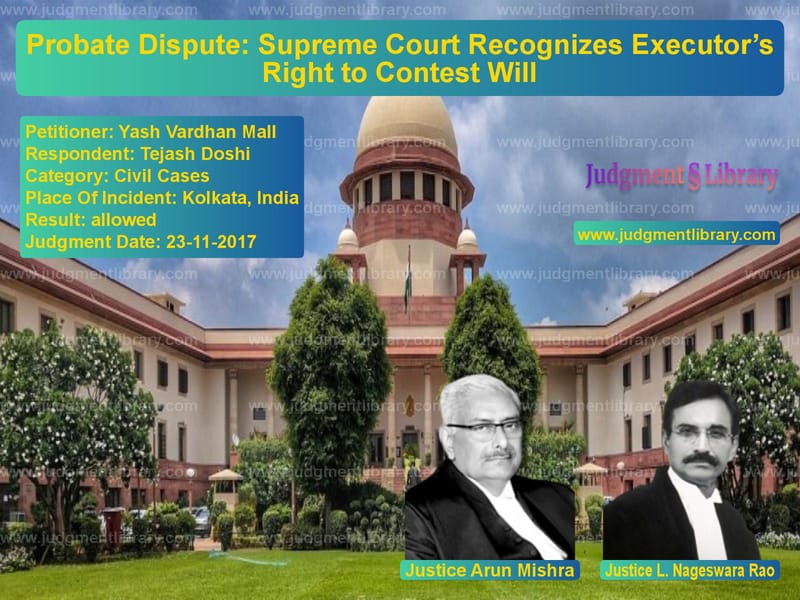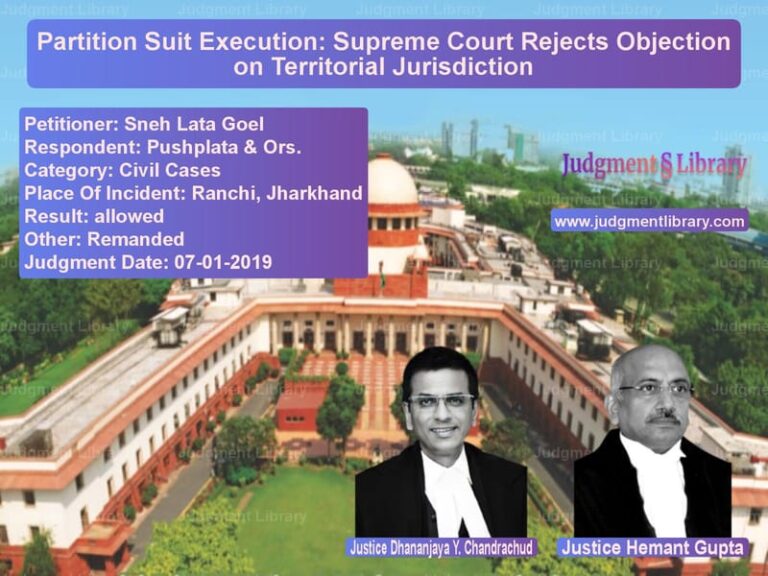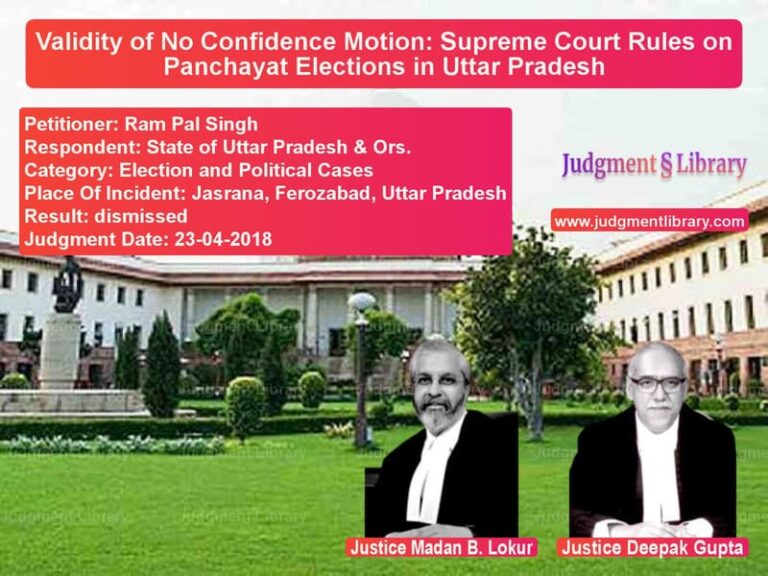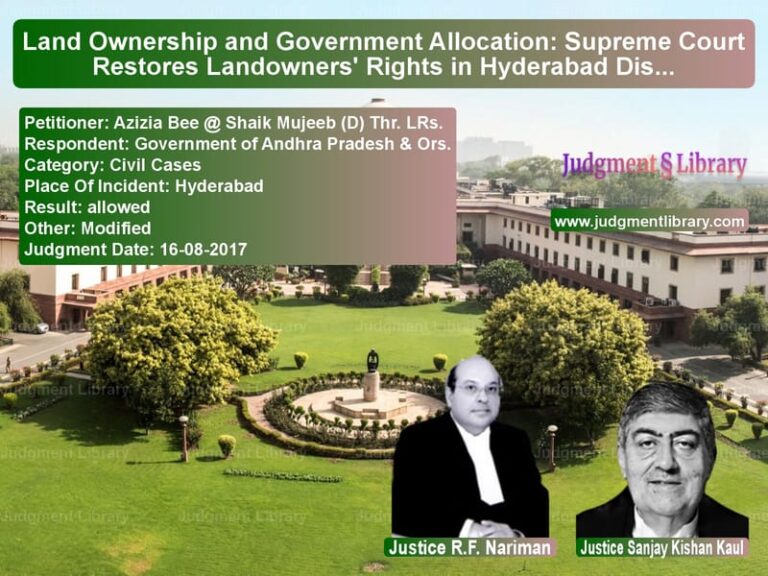Probate Dispute: Supreme Court Recognizes Executor’s Right to Contest Will
The Supreme Court of India recently ruled in the case of Yash Vardhan Mall vs. Tejash Doshi, which revolved around the validity of two conflicting Wills and the rights of an executor to contest the grant of probate. The judgment clarified the legal position regarding caveatable interest in probate proceedings and the procedural requirements for lodging a caveat under the Rules of the High Court at Calcutta (Original Side), 1914.
Background of the Case
The dispute arose from two different Wills allegedly executed by Smt. Shrutika Doshi. The first Will, dated March 1, 2013, appointed her husband, Tejash Doshi (the respondent), as the executor and trustee, with her minor daughters as the beneficiaries. The Will also stated that if Tejash Doshi was unable to act as the executor, the appellant, Yash Vardhan Mall, would take over as the executor.
However, a second Will, dated April 22, 2013, surfaced, in which Tejash Doshi was again appointed as the sole executor. In this later Will, if Tejash Doshi could not act as executor, his father would replace him. This Will contradicted the earlier one by removing Yash Vardhan Mall from any executorship role.
After the death of Shrutika Doshi on May 26, 2013, Tejash Doshi did not apply for probate of the March 1, 2013 Will for over two and a half years. As a result, Yash Vardhan Mall applied for probate of that Will. In response, Tejash Doshi filed an application (P.L.A. No. 123 of 2016) for the grant of probate of the April 22, 2013 Will before the Calcutta High Court.
Yash Vardhan Mall lodged a caveat, contesting the probate petition on June 15, 2016. However, Tejash Doshi filed an application (G.A. No. 888 of 2017) to discharge the caveat on the grounds that the affidavit supporting the caveat did not raise valid legal objections.
The Single Judge of the Calcutta High Court ruled in favor of Tejash Doshi and discharged the caveat. The Division Bench upheld this decision but noted that the appellant did have a caveatable interest. Dissatisfied, Yash Vardhan Mall approached the Supreme Court.
Petitioner’s Arguments (Yash Vardhan Mall)
The petitioner, represented by legal counsel, argued:
- As the executor named in the earlier Will (March 1, 2013), he had a legitimate right to contest the grant of probate for the later Will (April 22, 2013).
- The Single Judge erred in discharging his caveat on the grounds that his affidavit lacked grounds for objection.
- His affidavit had sufficiently stated that the March 1, 2013 Will was registered, whereas the April 22, 2013 Will was not.
- The Division Bench correctly recognized his caveatable interest but still upheld the discharge of the caveat, which was contradictory.
Respondent’s Arguments (Tejash Doshi)
The respondent countered:
- The later Will, dated April 22, 2013, was the deceased’s final Will and should be granted probate.
- The appellant’s affidavit did not contain legal objections that would justify his role in contesting the probate.
- The probate petition was pending for the April 22, 2013 Will, and the appellant’s attempt to claim executorship under the earlier Will had already been dismissed.
Supreme Court’s Judgment
The Supreme Court ruled in favor of Yash Vardhan Mall, holding that:
- “The appellant has a caveatable interest as the executor of a prior Will, and he has the right to contest the grant of probate for the later Will.”
- “An executor’s role includes ensuring the proper administration of the estate, which gives him the right to challenge conflicting Wills.”
- “The High Court Division Bench correctly held that the appellant had caveatable interest, but it contradicted itself by upholding the discharge of the caveat.”
- “The affidavit filed by the appellant contained sufficient grounds to contest the probate petition.”
The Supreme Court set aside the judgment of the Division Bench and reinstated the caveat filed by Yash Vardhan Mall.
Key Takeaways from the Judgment
- An executor of a prior Will has the right to contest the grant of probate for a later Will.
- The affidavit in support of a caveat must contain a statement of interest and the grounds for objection.
- Probate cases must be decided based on the validity of the last Will, and courts must ensure that all interested parties are heard.
- Executors have a duty to administer the estate, and their objections cannot be dismissed without due process.
Conclusion
The Supreme Court’s decision in this case reaffirmed the rights of executors to contest conflicting Wills and emphasized the importance of procedural fairness in probate matters. By recognizing the appellant’s caveatable interest, the Court ensured that all legitimate claims are given a fair hearing in testamentary proceedings.
Don’t miss out on the full details! Download the complete judgment in PDF format below and gain valuable insights instantly!
Download Judgment: Yash Vardhan Mall vs Tejash Doshi Supreme Court of India Judgment Dated 23-11-2017.pdf
Direct Downlaod Judgment: Direct downlaod this Judgment
See all petitions in Succession and Wills
See all petitions in Property Disputes
See all petitions in Legal Malpractice
See all petitions in Judgment by Arun Mishra
See all petitions in Judgment by L. Nageswara Rao
See all petitions in allowed
See all petitions in supreme court of India judgments November 2017
See all petitions in 2017 judgments
See all posts in Civil Cases Category
See all allowed petitions in Civil Cases Category
See all Dismissed petitions in Civil Cases Category
See all partially allowed petitions in Civil Cases Category







